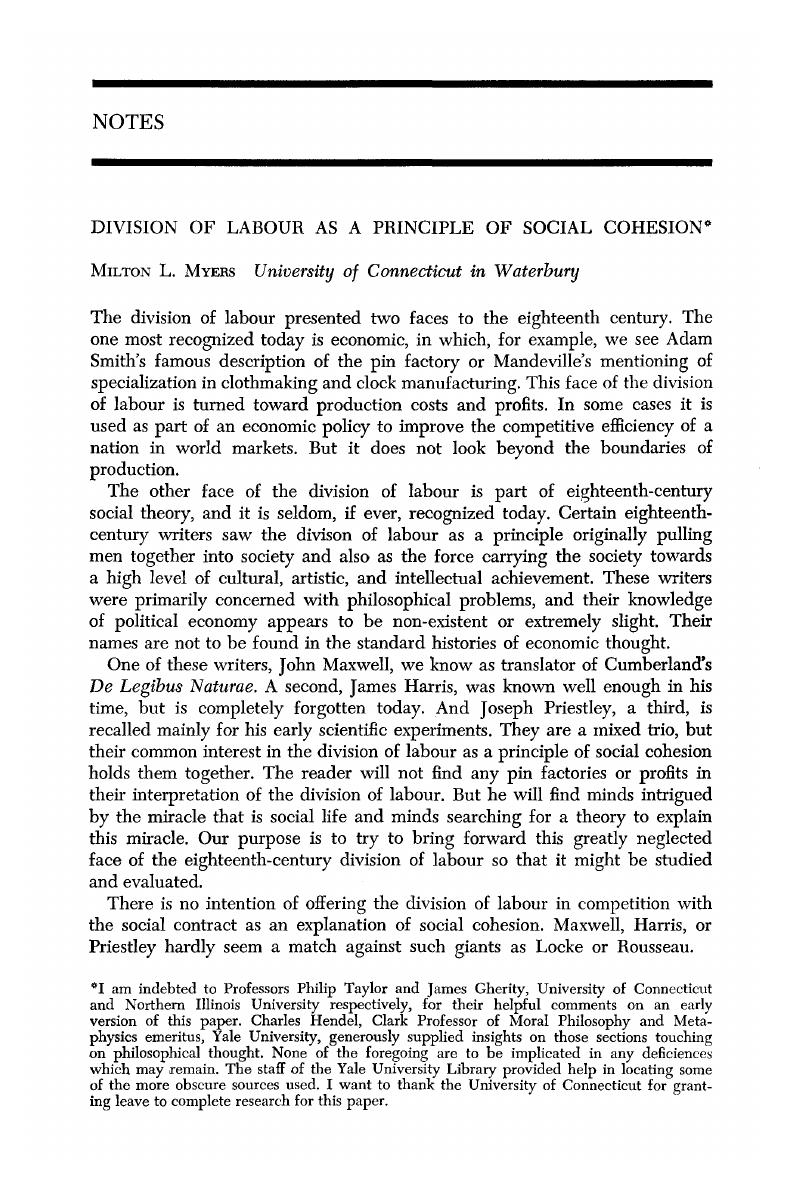Published online by Cambridge University Press: 07 November 2014

I am indebted to Professors Philip Taylor and James Gherity, University of Connecticut and Northern Illinois University respectively, for their helpful comments on an early version of this paper. Charles Hendel, Clark Professor of Moral Philosophy and Metaphysics emeritus, Yale University, generously supplied insights on those sections touching on philosophical thought. None of the foregoing are to be implicated in any deficiences which may remain. The staff of the Yale University Library provided help in locating some of the more obscure sources used. I want to thank the University of Connecticut for granting leave to complete research for this paper.
1 Maxwell, John, trans., Treatise of the Laws of Nature (London, 1727).Google Scholar For a full account of the literature attacking Hobbes see: Mintz, S. I., The Hunting of Leviathan (Cambridge, 1962).Google Scholar
2 Maxwell, , Treatise of the Laws of Nature, 118.Google Scholar
3 Ibid., 92.
4 Ibid., 92.
5 The great philosophic concern about the problem of private interest and public welfare is indicated by the number of works taking it as a major theme. Among them are: King, An Essay on the Origin of Evil; Shaftesbury, Characteristics; Jenyns, A Free Inquiry into the Nature and Origin of Evil. Pope's Essay on Man also has the harmony of interests as its central problem. Bonamy Dobree says of Pope's Essay: “It sums up … what might be called the popular philosophy of the day, that is, the assumptions underlying the behavior and beliefs … of the vast mass of educated men. …” Alexander Pope (London, 1963), 76.Google Scholar
6 Hull, C. H., ed., The Economic Writings of William Petty (New York, 1963), I, 260 Google Scholar; II, 473. Considerations on the East-India Trade in McCulloch, J. R., ed., Early English Tracts on Commerce (Cambridge, 1954), 591.Google Scholar Mandeville, Bernard, Fable of the Bees, Kaye, F. B., ed. (Oxford, 1924), I, 356 Google Scholar; II, 284. Locke also mentions the division of labour but avoids using it in the strictly workaday contexts of the above writers. His purpose, however, still remains economic because he uses the principle to buttress his argument for a labour theory of value. Two Treatises of Civil Government (Everyman, , ed., London, 1962), 136–37.Google Scholar
7 Economic Writings of Willian Petty, I, 260–1Google Scholar; Considerations on the East-India Trade.
8 Hume later also touches upon the socially cohesive effects of the division of labour in the Treatise of Human Nature (Everyman, ed., London, 1956), II, 191–3.Google Scholar
9 Harris appears to have been a figure of importance in his day. During his life he held a number of high positions: member of Parliament, Lord of Admiralty, Lord of Treasury, and Secretary and Comptroller to the Queen. Hume shows some interest in his works. Greig, J. Y. T., ed., Letters of David Hume (Oxford, 1932), I, 208.Google Scholar
10 Harris, James, Miscellanies, I, (London, 1792), 128–43.Google Scholar
11 Ibid., 147–9.
12 Ibid., 149–51.
13 Ibid., 151.
14 Ibid., 151–2.
15 Ibid., 152.
16 Ibid., 153.
17 Ibid.
18 Ibid.
19 Ibid., 154.
20 Ibid.
21 Ibid., 155.
22 22nd. ed. (London, 1771), 2.
23 Ibid., 3.
24 Ibid.
25 Ibid.
26 Ibid.
27 Ibid., 4.
28 Ibid., 4, 5.
29 (London, 1757), 15.
30 Ibid., 15n.
31 (New York, 1963), 7.
32 I (Dublin, 1770), 151.
33 Ibid., 157.
34 Cannan, E., ed., The Wealth of Nations (New York, 1937), 16.Google Scholar
35 Ibid., 16.
36 Sir David Ross, trans. (London, 1966), 118–20.
37 Ross, W. D., ed., The Works of Aristotle, X, (Oxford, 1966), 1261.Google Scholar
38 Dempsey, Bernard W., “Just Price in a Functional Economy,” American Economie Review, XXV (09 1935), 471–86.Google Scholar
39 Miscellanies, I, 152.Google Scholar
40 Ibid.
41 Essay on the History of Civil Society (Edinburgh, 1767), 277–8.Google Scholar
42 Ibid., 281. Ferguson is somewhat ambivalent about the effects of the division of labour. After describing the socially beneficial results of the principle he goes on to note its depressing effects on the individual worker. He says: “the genius of the master, perhaps, is cultivated, while that of the inferior workman lies waste.” A decade later Adam Smith will take a similar position. For a thorough discussion of Smith's position see West, E. G., “Adam Smith's Two Views of the Division of Labor,” Economica, 02 1964.Google Scholar
43 Essay on the First Principles of Government, 4.
44 Wealth of Nations, 10.
45 Ibid., 10.
46 Joseph Harris and Turgot take up the division of labour in the opening pages of their works and devote considerable space to it. Steuart builds the principle into the entire structure of his economics, and Adam Smith's foundational emphasis on the division of labour is well known. Smith devotes the first three chapters of The Wealth of Nations to the principle, not to mention the many references made to it throughout the rest of the work. In contrast, prior economic writers allotted only short and cursory references to the division of labour and buried these references in the inner pages of their works. In the period after the work of the philosophers, the division of labour rose to a much higher level of consciousness in the minds of economic writers.
47 Essay on the History of Civil Society, 281.